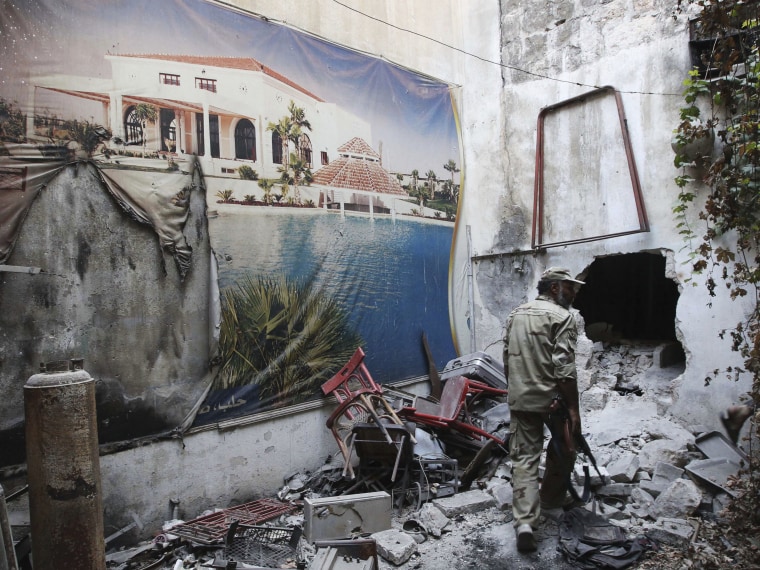Updated 11:45 p.m.
President Obama is nearing a decision on how America will respond to Syria's use of chemical weapons against its own people. Senior U.S. officials told NBC News that Washington may launch limited missile strikes against Syria "as early as Thursday."
The goal would not be "regime change" -- White House spokesman Jay Carney was explicit about that. But a several day series of "limited' missile strikes could cripple Syrian air assets and rupture President Bashar al-Assad's command-and-control capabilities.
American destroyers currently in the Mediterranean could launch Tomahawk cruise missiles into Syria--aimed not at chemical weapons storage sites, said The New York Times, which might create an environmental or humanitarian crisis, but at military units and headquarters.
As Obama huddles with military and diplomatic advisers, as well as conferring with allies, Senator John McCain has turned up the pressure for a significant U.S. action. The Arizona senator, speaking to reporters after an event about immigration reform, said that any strike against the Assad regime must have a "lasting impact," reported NBC News' Luke Russert.
“The important part of this whole situation is, is this just going to be just a retaliatory strike that has no lasting impact or something that changes the momentum on the ground in Syria?” he said.
McCain also wants Washington and its allies to arm the Syrian rebels.
President Assad has vowed to continue the fight that has killed more than 100,000 Syrians in the last two and a half years.
“Failure awaits the United States as in all previous wars it has unleashed, starting with Vietnam and up to the present day,” he warned the U.S. in an interview with a Russian newspaper published Monday.
Assad called U.S. claims that his regime launched a chemical attack outside a Damascus suburb last Wednesday “nonsense" and “an insult to common sense.” He charged the West with drumming up the charge as a politically motivated attack.
Secretary of State John Kerry described the evidence as “undeniable.”
"There...should be no doubt for anyone who approaches this logically that the Syrian regime is responsible for the use of chemical weapons on August 21outside of Damascus," said Carney on Tuesday during his daily press briefing.
Secretary of Defense Chuck Hagel said Tuesday that "the options are there, and the United States Department of Defense is ready to carry out those options," noting that any action would occur "in coordination with international partners."
The options under consideration "do not involve regime change," Carney said. He added that it is "absolutely in the national security interests of the United States and in the international community that the use of chemical weapons on the scale we saw on Aug. 21 cannot be ignored. It must be responded to."
In an effort to form an international coalition in support of Syrian intervention, Secretary of State Kerry spoke by phone Monday with his counterparts from the United Kingdom, Jordan, Turkey, Saudi Arabia, the United Arab Emirates, Qatar, as well as with representatives from the United Nations, NATO, the Arab League and the European Union. Representatives from Russia and China are expected to block any movement in the United Nations Security Council. President Obama spoke with UK Prime Minister David Cameron and French President François Hollande over the weekend in an effort to shore up support among the remaining Security Council permanent member nations.
The United Nations reported in June that the Syrian death toll had risen to more than 100,000 dead, which is likely a conservative estimate.
More than one million children have fled to neighboring countries, the U.N. said Friday, representing half of all refugees in an ongoing crisis that has spilled into Jordan, Turkey, Iraq, Lebanon, and Egypt--straining limited resources.
More than four million people, including more than two million children, have been displaced within their home country, according to the U.N. High Commissioner for Refugees and the U.N. Children’s Fund. The figures only include registered persons and are thought to be much higher.
In an impassioned press conference Monday, Kerry called the alleged chemical attack that killed hundreds and injured thousands more “a moral obscenity" and said there is no doubt the attacks were perpetrated by Assad's regime.
“By any standard, it is inexcusable,” Kerry said, “and despite excuses and equivocations, it is undeniable.” Kerry said the U.S. would be sharing evidence proving Assad’s culpability in the coming days.
It appears to be the worst chemical weapons attack in a quarter century, since former President of Iraq Saddam Hussein launched chemical weapons strikes in 1988, killings thousands of Iraqi Kurds.
The use of chemical weapons in Syria violates a “red line” delineated by Obama more than one year ago.
Reporting contributed by NBC News' Courtney Kube.
Watch a report from NBC's Jim Miklaszewski:
